
Nowadays, many jobs require Spanish language skills.
However, in specific fields like law, you often need very specific vocabulary.
In this post, you’ll find the best nine resources including courses, books, apps and websites for learning Spanish for lawyers so you’ll never object to learning.
Contents
Download:
This blog post is available as a convenient and portable PDF that you
can take anywhere.
Click here to get a copy. (Download)
Courses
1. Spanish for Lawyers from American University

Price: $1,100 (including a $200 non-refundable registration fee)
American University’s Washington College of Law offers a course on Spanish for lawyers that’s available online or in person.
This one is intended for Spanish students who are already at a high-intermediate or advanced level since it’s conducted completely in Spanish. This allows the course to move beyond any basics and focus more fully on terms and phrases related to law. Additionally, students must be law students, lawyers or another kind of legal professional.
For someone with a Spanish and law background, though, this is a good option. The instructors are Spanish and Latin American lawyers, so you’ll hear the words in appropriate context with accents you may hear in your practice. The course seeks to improve your legal reading, writing, speaking and listening skills.
While there’s an online weekly meeting, most of the work can be done independently so that you can fit it into your schedule.
The fee is set at a standard college rate with a discount available for alumni, non-profit workers and government employees. You’ll receive a certificate of completion if you pass the course.
2. Legal Spanish Course with Cervantes Escuela Internacional

Price: 580 €/1 week
The Cervantes Escuela Internacional (Cervantes International School) offers a legal Spanish course for law students, lawyers, translators and anyone else working in the legal field.
The course’s main goal is to prepare you to understand legal texts, prepare arguments and understand Spanish-speaking clients. Further, the course offers an overview of the legal system in Spain as well as helps students understand vocabulary related to the different branches of law.
The course is available at standard college rate fees. It’s delivered on location in Málaga, Spain, and the Cervantes Escuela Internacional helps international students find accommodation for the 2-week duration of the course. The course is recommended for students who already have a B1 (intermediate) level of Spanish.
Apps
3. Spanish Legal Dictionary by Word Magic Software
Available: iOS | Android

Price: $4.99 (or $0.99 for Android users)
You can download this handy legal dictionary app that also works offline so you don’t burn through data!
It’s great for learning legal Spanish or for keeping handy in case you encounter a Spanish speaker while at work.
The dictionary includes audio pronunciations, translations, definitions, examples and more. The dictionary even includes some colloquial phrases that you might hear.
For a fun learning experience, you can also shake your phone in this app to display a random word all while making those around you think you’re an odd duck.
4. FluentU
Available: Browser | iOS | Android
Price: $$ (free trial available)

FluentU takes real-world videos—like music videos, movie trailers, news and inspiring talks—and turns them into personalized language learning lessons.
Other sites use scripted content. FluentU uses a natural approach that helps you ease into the Spanish language and culture over time. You’ll learn Spanish as it’s actually spoken by real people.
FluentU has a wide variety of videos topics, as you can see here:
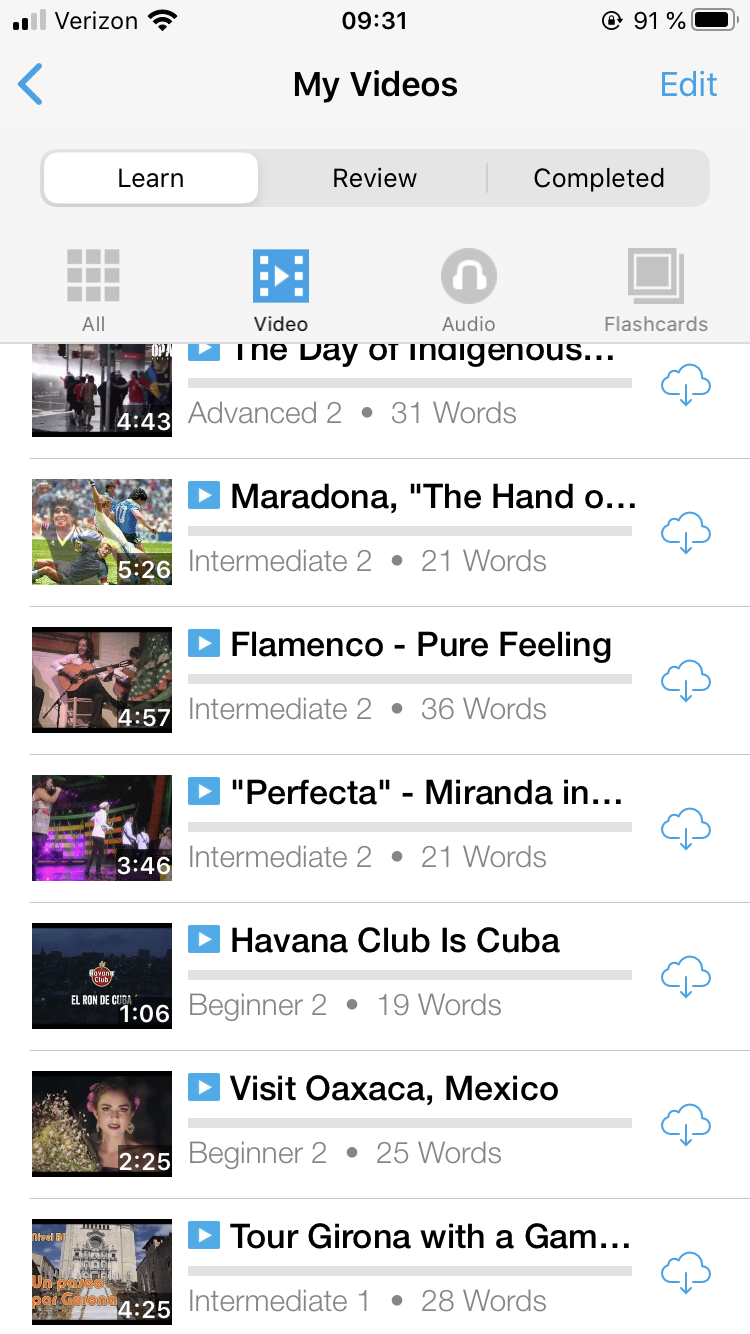
FluentU brings native videos within reach with interactive transcripts. You can tap on any word to look it up instantly. Every definition has examples that have been written to help you understand how the word is used.
Plus, if you see an interesting word you don’t know, you can add it to a vocab list.
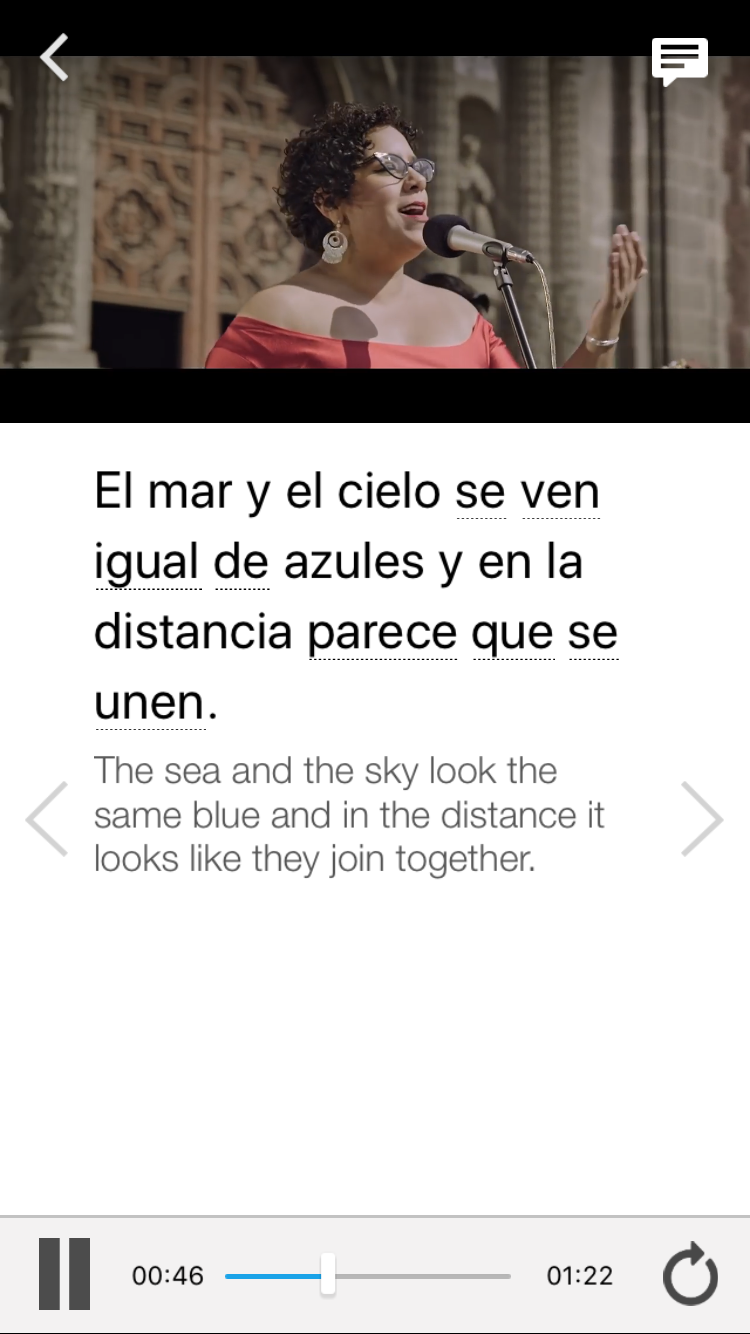
Review a complete interactive transcript under the Dialogue tab, and find words and phrases listed under Vocab.
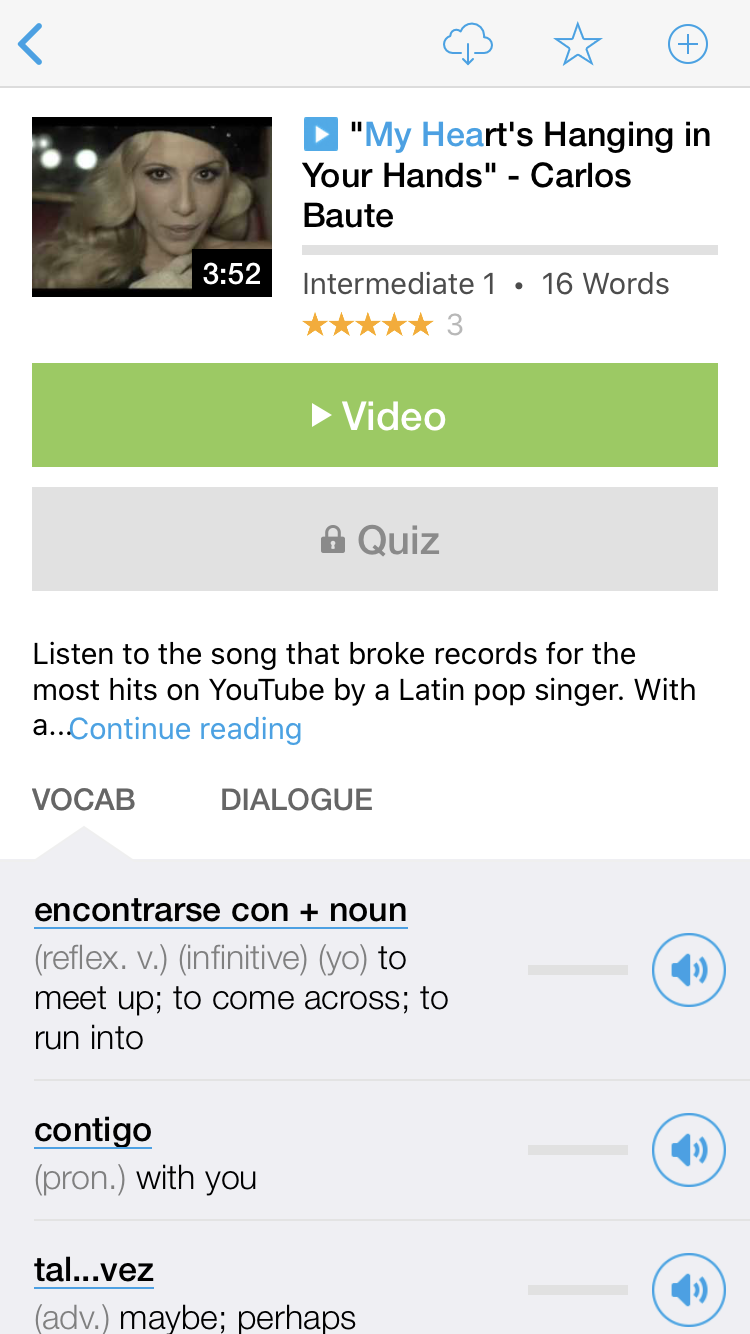
Learn all the vocabulary in any video with FluentU’s robust learning engine. Swipe left or right to see more examples of the word you’re on.
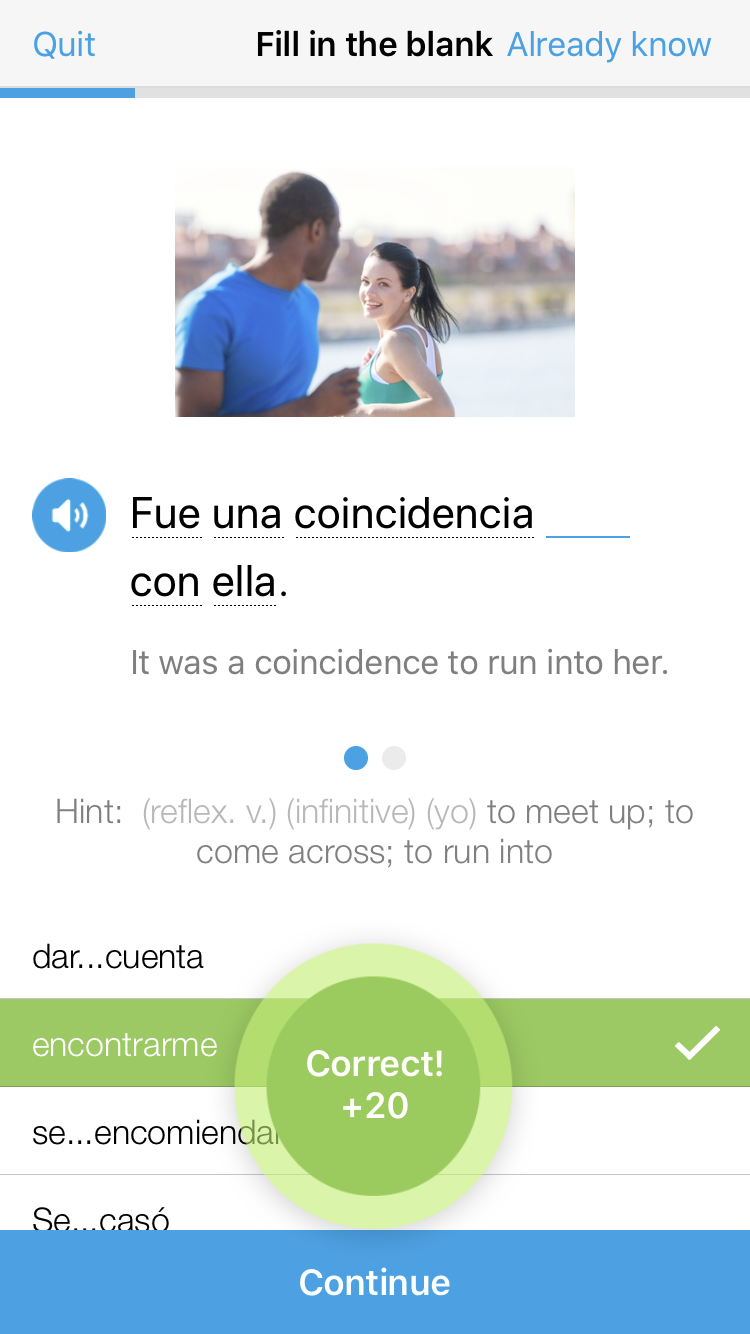
The best part is that FluentU keeps track of the vocabulary that you’re learning, and gives you extra practice with difficult words. It’ll even remind you when it’s time to review what you’ve learned. Every learner has a truly personalized experience, even if they’re studying with the same video.
Start using the FluentU website on your computer or tablet or, better yet, download the FluentU app from the iTunes or Google Play store. Click here to take advantage of our current sale! (Expires at the end of this month.)
Free Online Resources
5. Spanish for Lawyers by 123 Teach Me

123 Teach Me offers a number of great resources for learning legal Spanish, all condensed in one neat section of the site (linked above).
The legal Spanish flashcards offer a particularly flexible learning option. Each flashcard puts the Spanish word on one side of the card, with a related image along with the spoken word on the other side. You can set the flashcards to hide the printed English words or the Spanish words; you might want to play around with the settings to see what you find most useful for learning.
There also are other useful games and activities like Drag-n-Match, Spanish Spell Out, Image Sentence Match and Word Order Quiz. With so many great options, 123 Teach Me is an excellent resource for learning legal Spanish or reinforcing what you learned elsewhere.
6. “Legal Terminology in Spanish” by Spanish Tutor
Yes, this is one single YouTube video, but you can get a lot of mileage out of it.
This video has an especially nice selection of words and phrases for anyone in a legal field. Both the Spanish and English versions of each word/phrase appear on screen while a voice speaks the Spanish word/phrase slowly and clearly. This will help you get the pronunciation down and connect the spoken word to its written version.
Plus, after you’ve squeezed every last drop of learning from this one video, you can explore the rest of the Spanish Tutor channel’s offerings, which cover fundamental Spanish lessons, more advanced Spanish grammar as well as key legal topics like “Verbs used in the legal field in Spanish” and “Immigration Vocabulary in Spanish.”
Books
7. “Spanish for Attorneys and Paralegals”
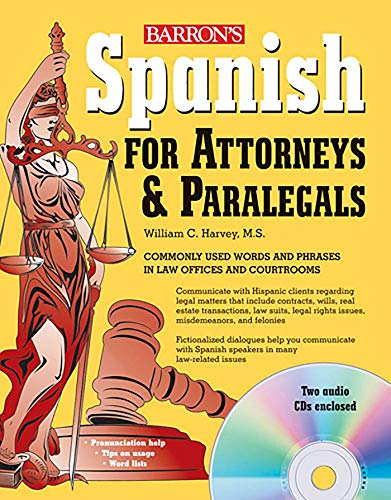
This book offers a wide selection of vocabulary for topics ranging from contracts to felonies to immigration—honestly, it includes nearly any law topic you might need to know. It’s also neatly organized so you can easily focus on any topic of interest without encountering any superfluous vocabulary words.
“Spanish for Attorneys and Paralegals” also includes word lists, usage tips and pronunciation help (both in the text and with two audio CDs).
While the book assumes that you’ll have some basic Spanish skills, it isn’t essential that you’ve developed any Spanish skills at all yet. Even complete beginners will be able to pick up tons of useful words and phrases with the glossary in the back of this excellent guide, and the book does a nice job of walking readers through the basics on the way to legal terminology usage. So, this book will benefit anyone from novice to advanced levels of learning.
8. “The ABA Spanish Legal Phrasebook”

This helpful phrasebook can fit in your pocket if you need it at work, but you can also use it to more thoroughly study and learn new words and phrases.
The content is conveniently organized by legal specialties (family law, criminal law, etc.), so you can easily focus on the words and phrases that will most benefit your practice.
9. “Companion Book for Translators and Interpreters: The 1000+ Key English-Spanish Legal Terms You Will Need to Know”

While this book is aimed at translators and interpreters, it’s a great resource for anyone in a legal profession since it offers a lot of helpful terms.
This book is best for students with some experience, though, since some words offer multiple translations and it can be hard to distinguish between the different options.
Why Should Lawyers Learn Spanish?
The Spanish-speaking population is rapidly growing. This means more and more people speak Spanish as their primary language, which means you’re much more likely to have clients who speak Spanish.
Learning Spanish will allow you to better communicate with your clients. When someone visits a lawyer, it’s seldom happy-good times for him or her. Even if a client speaks some English, if Spanish is his or her primary language, he or she may be more comfortable speaking Spanish. They may also feel more comfortable simply knowing that you know their language.
If you speak Spanish, not only will this make the situation less stressful for the client, it will also help him or her provide the information you need to do your job. Plus, rather than piecing together information based on what words you and your client both understand, you’ll be able to ask specific questions and garner specific, precise responses.
Learning Spanish will improve your job prospects. Some jobs require Spanish skills. However, even if a job doesn’t specifically require that you speak Spanish, it’s a helpful skill that will set you apart from others applying for the position. It’s a great way to make your résumé much more appealing to employers.
With so many great resources out there for learning legal Spanish, it’s easy to give legal Spanish terms their due diligence.
You’ll be happy that you did.
Download:
This blog post is available as a convenient and portable PDF that you
can take anywhere.
Click here to get a copy. (Download)



